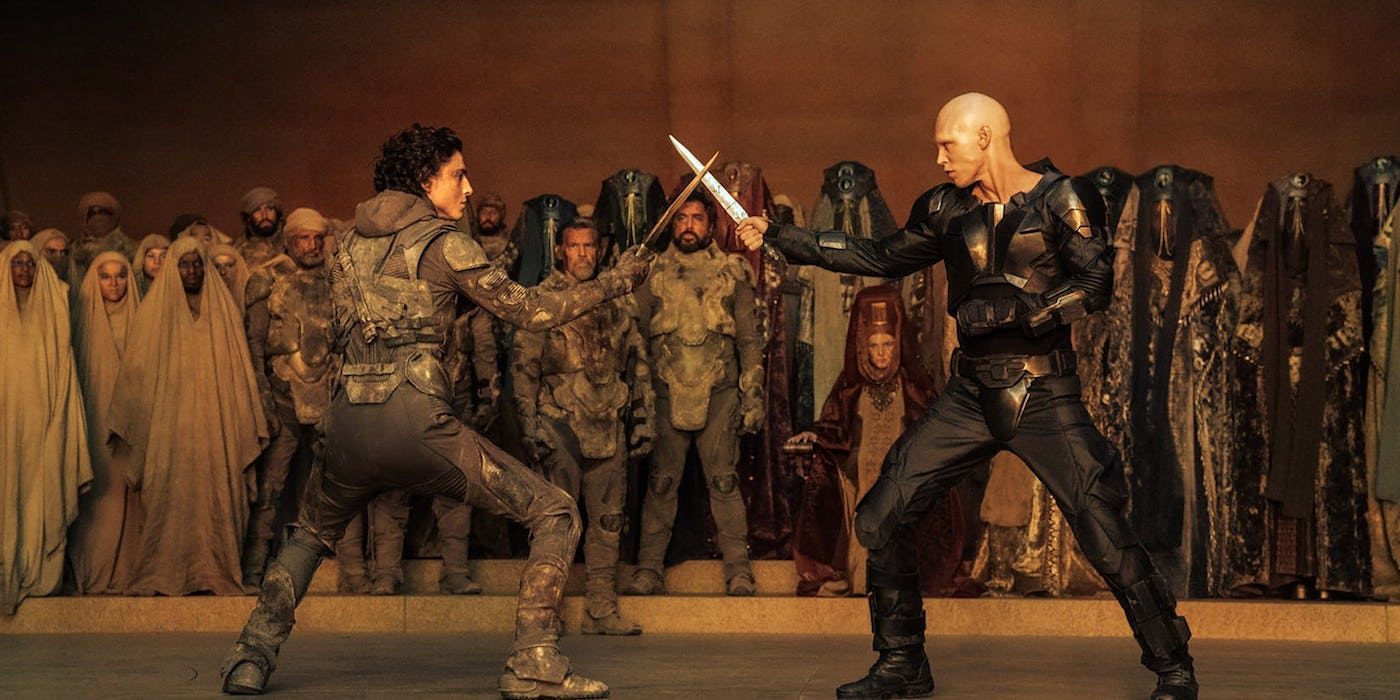Summary
- Dune: Part Two put a lot of factors in play when it came to setting up the future of the franchise.
- One key moment led to Paul being called an abomination by the Bene Gesserit.
- This nickname may seem like a jab at first, but it actually helps to perfectly establish Dune: Messiah.
Adapted from the mindblowing fictitious world of Frank Herbert’s highly-acclaimed novel series, the Dune movie series has embedded itself as a true masterpiece in the sci-fi genre. Continuing Paul Atreides’ journey from Dune, Denis Villeneuve’s next installment opened a doorway to countless questions and potential plotlines for upcoming sequels. Herbert’s work is a complicated piece of exceptional world-building and lore that the movies can’t even begin to incorporate to even a considerable extent.
Despite staying mostly true to the source material, fans still have several questions about Dune: Part Two’s ending and how it sets up other adaptations of Herbert’s work, especially Dune: Messiah. The two-part movie series has more or less covered the events of the first book, but Paul Atreides’ ascendence to the throne can completely shift the storytelling aspect and introduce the core concepts of the sci-fi story that only book fanatics are currently aware of.
What Exactly Does the “Sisterhood” Want?
Paul Atreides Was Their Likely Candidate For Seeking Ultimate Control
- The Bene Gesserit is a group of highly skilled women who have meticulously planned themselves in the most powerful places.
- They are key players in the political canvas and mostly work from the shadows.
- They have a centuries-old plan that the Sisterhood worked hard to see through.
1:27

How to Read All 23 Dune Books in the Proper Order
Fans have long debated whether the proper order to read every Dune book is chronologically or by publication order, and each method has merit.
The Dune movies haven’t really gotten into the full extent of the Sisterhood’s origin and backstory. Besides being a key player in global politics, the Bene Gesserit has a deeply woven role in humanity’s salvation that dates back centuries. Their goal is to operate behind the curtains to ensure that humanity thrives, yet they are the ones who pull the strings and stay on top. Their religious influence has allowed them to become impenetrable to forces who seek to challenge their authority and might. The Bene Gesserit has several agendas, but their ambitions are solely focused on the ascendence of their “chosen one” or, as they call him, “Kwisatz Haderach.” So that their “messiah” would rule over humanity and they would have a hidden stewardship over the matters.
The Sisterhood planned a painfully long and intricate breeding cycle to produce just the right bloodline and heirs to ensure their ultimate plan came to fruition. They used their power to infiltrate the Great Houses and the Imperial Court by having their women be important figures in the courts, advisors, teachers for noble females, and political mediators. Apart from exercising full control, the Bene Gesserit also desires to access the genetic memories of their male ancestors. The conscious and genetic memories of the masculine side of their ancestry have always posed as a sort of mystery and a source of repulsion for the Bene Gesserit. That’s why they seek the perfect candidate who could become the Kwisatz Haderach – someone who could unlock both the female and male genetic memories and access unprecedented powers.
After instilling their chosen candidate, the Bene Gesserit would control this new leader and enjoy access to unlimited knowledge. However, their 10,000-year-long carefully planned breeding scheme came to a halt when Lady Jessica gave birth to Paul. This was not supposed to happen as, according to the Bene Gesserit plans, Leto Atreides was to have a female heir who would then be married off to a Harkonnen male to give birth to Kwisatz Haderach. However, moved by her deep love for Duke Leto and his desire for a male heir led Lady Jessica to give birth to a boy. This produced a sense of distrust and curiosity among the Sisterhood, especially about the true nature of Paul’s birth.
Why the Bene Gesserit Can’t Control Paul?
The Sisterhood Wished to Exploit the Powers of the Kwisatz Haderach
- The Bene Gesserit sought to end House Streides because of their defiance of the Sisterhood’s ways.
- They feared the same sense of disobedience from Paul and his mother.
- The Bene Gesserit considered Paul to have all the characteristics of their “chosen one” but feared that he was unstable.

REVIEW: Dune: Part Two is the Complicated Sci-Fi Savior That We Need
Denis Villeneuve’s Dune: Part Two is a huge step forward for the series and one of the most bold examples of large-scale sci-fi storytelling.
Although their plan didn’t go as designed, the Bene Gesserit didn’t completely ignore Paul’s existence. Lady Jessica taught him the ways of the Sisterhood and helped him hone “The Voice,” a power that is exclusively reserved for the Bene Gesserit. Paul’s potential and early signs of harboring the power to see the future led the Sisterhood to believe that he might be the Kwisatz Haderach – the promised prophet who would lead the universe to an era of lasting prosperity. However, their involvement in sentencing House Atreides to doom at the hands of Harkonnans sowed the seed of hatred in Paul. He vowed not to be controlled by the Sisterhood, which made him a liability. In Dune, Paul only shows a tiny demonstration of his powers, but getting exposed to the spice unlocked his abilities to an extent. He started to see the future but in fragments.
However, by the end of the first movie, Paul has only one goal, which is to survive and avenge his House. In Dune: Part Two, Paul’s impressive adaptation of the Fremen ways and becoming a formidable fighter triggered a religious sentiment. Although Paul was adamant about considering himself the Lisan-Al-Ghaib (the promised prophet), the Fremen had already considered him their Messiah. Paul knew from his visions of the future that his accepting the role and going south would bring death and destruction. However, when the Fremen’s main seitch was attacked, Paul was forced to unite the people by becoming their “Mahdi,” and the only way to do that was to unlock his powers fully.
That’s why Paul drank the Water of Life despite the Bene Gesserit considering it forbidden. It is mentioned in the movie that no man can survive drinking the Water of Life. However, Paul not only survived but also broke multiple cardinal rules of the Sisterhood, which further severed their intentions to use him. His mother had already defied the Bene Gesserit by bearing him, but she also taught him the ways that allowed him to unlock centuries of genetic memories.
The Significance of Calling Paul Atreides an “Abomination”
The Term “Abomination” Has Great Significance in the Dune Lore
- Paul Atreides harbored a hatred towards the Sisterhood for their involvement in his House’s downfall.
- He defied the Bene Gesserit laws and drank the Water of Life.
- Paul unlocking genetic memories and the power to see the future shocked the Bene Gesserit.

Dune’s Influence on Star Wars Goes Beyond the Original Trilogy
There is no doubt that Frank Herbert’s Dune was a huge inspiration for the original Star Wars, but did it also inspire its prequels?
It’s difficult to say whether the Sisterhood is completely aware of what Paul had done. However, when Paul uses “The Voice” on the Reverend Mother while confronting the Emperor, it makes her call him an “abomination” in utter shock. The word abomination has a great meaning in the Dune lore, but it hasn’t been fully explored in the movies. The term refers to a “pre-born” child who has been “possessed” or influenced by the memories and the personalities of those before. When the Bene Gesserit drinks the Water of Life, she’s usually a grown woman with a personality of her own. However, when that happens in infancy, the child is usually possessed by a dominant ancestral personality that latches itself to the child’s psyche. In Paul’s case, the Reverend Mother said it because of her incapacity to assess the reach of Paul’s powers and their lack of control over him.
In other words, the Bene Gesserit also considers anyone they can’t control or pre-condition as an “abomination” to their planned breeding program. Paul defied their ways and laws from the moment he was born, but he crossed all limits by drinking the Water of Life and unlocking genetic memory that the Bene Gesserit couldn’t access. They needed a male to survive the dominance of their male ancestry but also desired full control of this super being who was going to give them the universe. Surprisingly, when the Reverend Mother Mohiam calls Paul an abomination, she also briefly looks at Jessica’s pregnant belly, which could indicate that she was maybe talking about Paul’s unborn sister or both siblings as the two were born outside of their intended plans.
How Does Dune 2 Ending Set Up Dune: Messiah?
The Arrival of a New Character Can Connect to Dune: Messiah
- Anya Taylor Joy’s brief cameo sets up a major character for Dune: Messiah.
- The upcoming sequel may connect to the storyline of Herbert’s Dune: Messiah.
- Paul’s sister is considered as the true pre-born or “abomination.”

Dune: 15 Strongest Main Characters, Ranked
Whether by sheer brutality, influence, or motivation, the Dune franchise’s main characters prove their strength in the harsh world of Arrakis.
When Jessica took the Water of Life to become the Reverend Mother on Arrakis, she failed to inform the Fremen about her pregnancy. The ritual exposed the fetus to the toxins that triggered the “possession” of Paul’s unborn sister, who would later be known as Alia. Although Paul is at the center of things according to the events of Dune: Part Two, Anya Taylor-Joy’s cameo in his visions of the future indicates that she would have a crucial role to play in Dune: Messiah. The Reverend Mother’s acknowledgment of her existence perfectly sets up the events of Dune: Messiah, Herbert’s second novel in the Dune series. Alia fits the description of a pre-born child perfectly because it’s seen throughout Dune: Part Two how she influences Jessica and her decisions. She is constantly talking to her daughter and telling Paul what she thinks. As an unborn child, she is unnaturally aware of her surroundings as well as of the events that might or should unfold.
This could mean that Alia might be influenced by her ancestral memories and thus cause chaos in the natural order of things. The Bene Gesserit are right to consider the Atreides siblings dangerous because of their deviation from their customs and setting up a path that the Sisterhood hasn’t comprehended. Alia’s possible introduction in Dune: Messiah is a perfect opportunity to pull a few story arcs from the book. For the time being, it’s difficult to say how much of Denis Villeneuve’s trilogy will be based on Messiah. With reports of script completion coming out in December 2023, fans can expect to have their questions answered soon enough.



